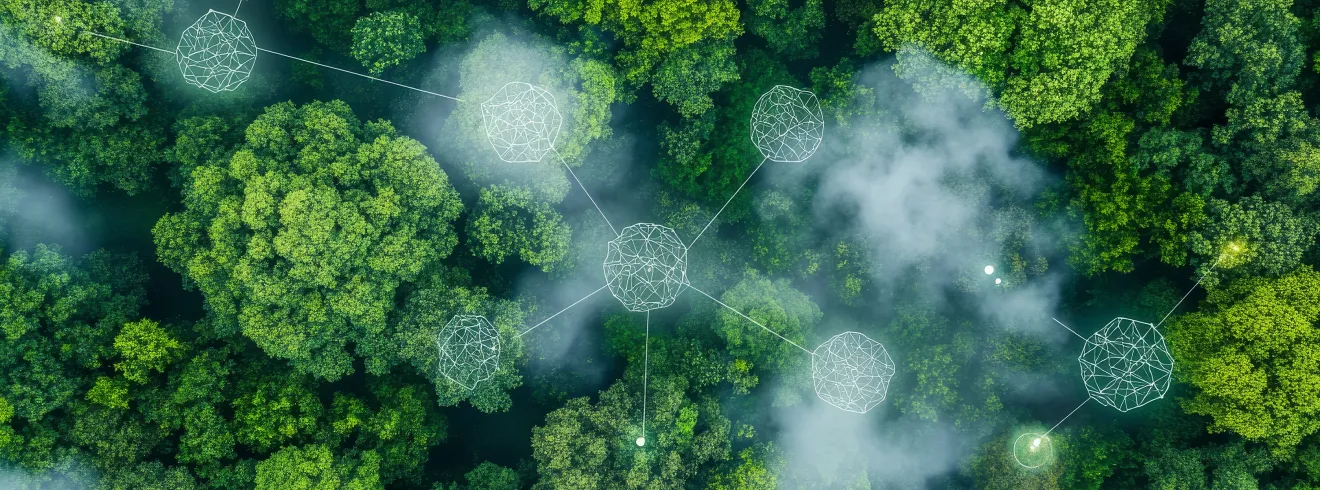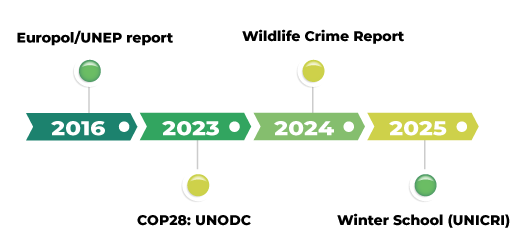
Deadline for application: 12 November 2025
Due to climate change, environmental preservation and defense have become a priority in the UN strategy to reach the 2030 Agenda Sustainable Development goals. The Agenda highlights that environmental degradation's negative impacts are one of the century's wicked challenges together with environmental depletion. At the Conference of Parties 28 of 2023, UNODC evidenced the need to address environmental crimes to endorse climate change mitigation. For an immediate global response to reach the SDGs, it encouraged a strong justice commitment and cooperation among Member States to fight environmental crimes.
Ahead of time, since 2016, according to the joint strategic report of the EUROPOL and the UNEP “The Rise of Environmental Crime” (2016), violation of the environment is nowadays the fourth largest criminal offense worldwide. This phenomenon has notably increased, and it is expected to expand all over the world in the next years due to the unfolding transnational criminals. Member States and international organizations are urgently working to avoid this crime commitment and to educate people on the consequences of exposure. Indeed, as a transnational crime activity, people and groups of people are benefiting from damaging the ecosystems and their inhabitants.
In the 2024 World Wildlife Crime Report, one of the key messages highlights the strict interconnection between wildlife crimes and organized crime. As this type of crime is one of the activities taken in place by large, organized transnational crime groups, it requires a complex and broader strategy that should intervene on these groups.
With these considerations in mind, UNICRI and the Italian Society for International Organization (SIOI) are organizing the ninth edition of the Winter School on Environmental Crimes, which will be delivered online, from 17 to 21 November 2025.

The course will provide participants with a fundamental understanding of what environmental crimes are and how law enforcement bodies and judicial systems are responding. The Winter School contributes to advancing and promoting justice by raising awareness on this topic. For the participants, identifying the different forms, offenders, and acts of eco-crimes is the first step in the advocacy path. People's vulnerability is less threatened when individuals advocate for an effective change in public policies, strategies, and practices.
As it cannot exist sustainable development within a society threatened and not healthy and inclusive, the Winter School is delivered in a multidisciplinary and comprehensive approach. The existing international legal framework will be examined to improve participants’ ability to comprehensively address the issue. More specifically, the curriculum of the course may focus on:
Existing international legal frameworks to prevent crimes against the environment.
Environment and illegal mining.
The concept of environmental protection and its evolution.
Environmental crimes and terrorism.
Involvement of organized criminal groups in environmental crimes.
Waste trafficking and its impact on human health and security.
Wildlife crimes.
Environmental conflicts and justice.
Individual, corporate and State accountability for environmental crimes.
The Winter School offers professional, legal, social, scientific, and academic perspectives through live webinars, group discussions, dynamic case studies, individual readings, and practical exercises. The faculty is composed of leading scholars and academics from leading universities, representatives of the United Nations system, international human rights bodies, and civil society.
Through a dedicated online platform, participants will have the opportunity to interact with internationally recognized experts and peers from all over the world, so to build lasting professional relationships. This experience fosters intercultural dialogue and promotes a deeper understanding of some of the world’s most complex and debated issues.
Relevant information
Dates | 17-21 November 2025 |
| Venue | Online |
| Application deadline | 12 November 2025 (rolling basis) |
| Confirmation of acceptance | Within 1 week following receipt of the application |
| Payment deadline | Within 1 week following confirmation of acceptance |
1. Entry requirements
The course is intended for university and post-graduate students, Ph.D. candidates, media and other professionals, including United Nations (UN) personnel, as well as anyone interested in gaining a deep knowledge of current environmental crimes issues.
Candidates must meet the following minimum requirements:
Be enrolled in, or have completed, a first university degree program (minimum bachelor’s level or equivalent).
Possess a strong command of the English language.
2. Course Methodology
This course is delivered online. It combines live webinars in our virtual classroom, led by subject matter experts, with self-paced activities and interactive group discussions.
The live webinars are conducted on a dedicated online platform. Participants need a computer (recommended) or a mobile device with audio and video capabilities, a headset with a microphone to connect to the audio through the computer or mobile device, as well as a reliable internet connection. We recommend accessing audio through the computer. No special software is required. Upon acceptance to the course, participants will be provided with the information to access the platform.
The live webinars are from 2:00 pm to 6:00 pm Rome time (8:00 am to 12:00 pm New York time), from Monday to Friday.
3. How to apply
The selection is carried out on a rolling basis.
- Application deadline: please complete and send the application form - and a scanned copy of your valid passport - to unicri.courses@un.org and formint@sioi.org by 12 November 2025
- Confirmation of acceptance: the results of the selection process will be communicated via e-mail within 1 week following receipt of the application.
- Payment deadline: full payment has to be finalized within 1 week following confirmation of acceptance (i.e. candidates should provide UNICRI and SIOI with proof of payment via e-mail to unicri.courses@un.org and formint@sioi.org).
Download the Application form:
4. Registration Fees
Registration fees amounts to 800 Euro.
Registration fees includes:
- Tuition
- Course material on electronic version
5. Cancellation and Refunds
In the event of a participant cancellation for any reason, including visa denial, registration fees will not be refunded.
6. Certificate of participation
Upon attendance of all live webinars and completion of the course activities and assignments, participants will receive a certificate of participation jointly released by the United Nations and SIOI. The Organizers retain the discretion to consider severe reasons for absences when issuing the certificate.
7. Contacts
Email: unicri.courses@un.org – formint@sioi.org (please indicate “Environmental Crimes” in the subject of the email)
UNICRI: +39 06 6789 907 | SIOI: +39 06 6920781